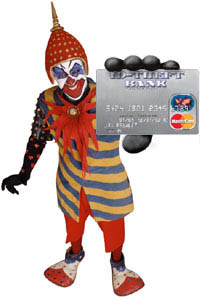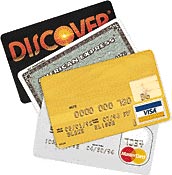| (insert your NIE or newspaper logo here) |
Weekly Online LessonOnline Lesson ArchiveGrade Level: 8-12
|
Credit Card Scare
 On Friday, June 17, 2005, MasterCard International reported that
hackers had infiltrated the computers of a major credit card payment
processing company, CardSystems Solutions, Inc.
On Friday, June 17, 2005, MasterCard International reported that
hackers had infiltrated the computers of a major credit card payment
processing company, CardSystems Solutions, Inc.
CardSystems stores information on about 40 million credit accounts in their system. - including 20 million Visa and nearly 14 million MasterCard holders, along with a few who carry American Express and Discover cards.
MasterCard's spokesperson, Jessica Antle, said that only about 68,000 of MasterCard's 14 million accounts there were at high risk of credit card fraud, and none need worry about identity theft.
Visa USA has not revealed how many, if any, of their accounts are at high risk.
About three-quarters of American families own at least one general purpose credit card, like MasterCard or Visa. And although fraud, driven by thieves, is clearly a risk, it may be that consumers themselves are their own worst enemies.
For example, while some card holders use their credit lines as money management tools, many others use them to spend beyond their real incomes, digging themselves deeper and deeper into debt.
College students are especially bombarded by credit card applications, which promise immediate credit of several hundred dollars or more with low interest rates of zero to five percent. Many students get snared by the ease of using money on-demand and quickly max out their credit lines.
Too often, card holders make only the miniumum monthly payments, which barely cover the finance charges and hardly shrink their card balance. Furthermore, introductory interest rates give way to ones as high as 23 percent, and fees for late payments and going over the credit limit - typically $20 to $30 monthly - make the debt monster even fatter.
In the end, many people who charge purchases on their credit cards pay more for the same merchandise and services than those who pay cash from their pockets.
To prepare for the onslaught of credit card applications and related issues you're bound to face in the years ahead, this week you'll learn about how credit cards work. You'll also test your wits and skills in the consumer jungle.
Understanding Credit Cards
 Let's
start by going to HowStuffWorks to find out How
Credit Cards Work.
Let's
start by going to HowStuffWorks to find out How
Credit Cards Work.
Read the introduction, then go to the next page for A Bit of History. What was the first universal credit card? How did credit cards evolve from being business-specific to nationally acceptable? What were some factors that drove the development and use of credit cards during the 1950s?
Now let's examine the credit card itself, By the Numbers and including The Stripe. What kind of specific information is contained in the numbers and the magstripe?
Next, discover how Authentication works, how Smart Cards will improve security precautions, why people are concerned about Online Safety, and how Other Methods of Protection help avoid credit card fraud by unauthorized users.
If someone owns a credit card, what steps can he or she take to avoid theft? What steps should merchants take - online and offline - to help protect customers from fraud?
When applying for a credit card application, there's also some Financial Jargon to be aware of. What's does APR stand for? What's the difference between fixed and variable rates?
 Now,
let's review the importance of Shopping
Around for things you want to buy, take a look at Credit
Issues, and learn what it means when you're Pre-approved
for a card.
Now,
let's review the importance of Shopping
Around for things you want to buy, take a look at Credit
Issues, and learn what it means when you're Pre-approved
for a card.
How does whether you have good or bad credit and lower or higher income affect the kind of credit card you can get? Why should you read the fine print on every credit card application?
Of course, there are also different Card Types that are available. Why might someone prefer one type of card over another? Why might a person want more than one type of card?
When choosing which credit card to apply for, why is it important to compare The All-important Plan, and whether the interest is calculated using a Fixed v. Variable Rate?
There are also some insights to gain - and money to save - when Paying the Bill and Catching Errors on your credit card. In what ways does the Fair Credit Billing Act help protect your rights, especially if you are a pro-active consumer?
Next, find out what it takes to Qualify for a Credit Card and what steps you can take for Getting Out of Debt. What factors can help you get a credit card? What factors can hurt you? What are some of the ways you can manage debt and get rid of it?
Welcome to the Jungle
 With
the basics under your belt, you're ready to get some experience in the
Consumer
Jungle - and, more specifically, in the Credit
Cave.
With
the basics under your belt, you're ready to get some experience in the
Consumer
Jungle - and, more specifically, in the Credit
Cave.
Begin with Word Up! to review some terms that may or may not be familiar to you.
Next, Tour the Temple, making sure to read the answer Explained on the left-hand side. How well did you do in identifying open, closed and service credit? How do the advantages and disadvantages of credit compare?
Now it's time to Show Me the Money, where you will analyze the credit application and terms offered to you by Platinum Spending. How easy was it to identify the various fees and finance charges? Can you see how those can add up quickly, if a consumer doesn't carefully manage the account?
Lastly, take your chances on the Credit Safari. How did your choices affect your credit card balance? What factors influenced your decisions?
Newspaper Activities
Browse issues of The Salt Lake Tribune to find articles about credit card companies, fraud, or theft. Have law enforcement officials caught the CardSystems thieves? If not, what challenges do they face? If so, how exactly were they able to find them? Are there any reports of fraud directly related to this particular incident? Has anyone reported related statistics? Have any credit card companies recently introduced new technologies to help prevent fraud or theft? Has the government done anything new to help thwart these types of crimes? Are there any court cases in which credit card thieves or others who have illegally obtained personal or financial information are being prosecuted? If you find features about managing credit, do they give any additional advice not covered in this week's lesson? Also, look for advertisements for credit cards or loans and compare rates and terms. What types of credit seem like the best, and less risky, way to go?
© Copyright 2005
Learners
Online,
Inc.
